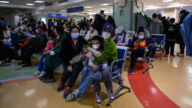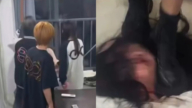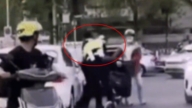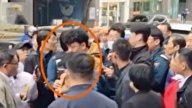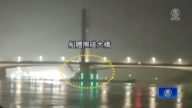【新唐人2013年06月18日訊】在中國廣東西部地區,遍佈著各種大大小小的民間地下組織,這些組織受到越來越多民眾甚至官員的歡迎,一些老牌地下組織在當地的聲望和支持度,遠遠超過了村委會。村民表示,如果當官不為民做主,那就只能靠自己。網民分析,大陸民眾的日益覺醒,會使這類民間組織遍佈全中國,挑戰日益腐敗的中共政權。
據大陸媒體披露,在大陸廣東,特別是粵西農村,正在形成一股民間地下組織熱潮。各種「兄弟會」、「青年會」、「姐妹會」相繼建立,這些神秘的地下組織,沒有人說得清具體有多少,也沒有人統計過有多少人加入,但是卻受到了民眾的歡迎和支持,很多官員和商人也加入其中。
例如﹕廣東湛江市遂溪縣城月鎮的「A兄弟會」,有一名會員就是小學校長。這些會員每年每人繳納100元會費,並且規定,無論是「紅事」還是「白事」,會員都要有力出力,有錢出錢。加入「兄弟會」的人不但結拜成兄弟,而且彼此無條件幫助,因此吸引了很多人參加。
廣州維權人士郭建和:「現在比我們那個年代,就是說70年代那些人,已經覺悟很多了,現在的年輕人啊,他們的目地是推進民主、互助。」
與之相反的是,當地政府、或村委會官員,對這些民間組織的評價極差,他們認為「青年會」干涉村裡政務,經常參與糾紛處理,架空了他們權力,甚至通過非法手段與村民爭奪利益。但村民表示,侵害他們權益的卻是中共官員,而「青年會」等組織,恰恰在為村民出頭。
廣東湛江市遂溪縣村民袁先生:「這個民間組織應該有的,因為這個受害者,在北京或者是當地信訪以後,政府這些狗官,把這些人,把上訪的受害者打傷、打殘廢、打死啊,這個受害人得不到政府的公道的處理,所以我們就要團結起來,大家互相幫助,為這個受害人討回公道。」
廣東佛山市順德區獨立候選人李碧云:「是自發組成這個組織的,因為順德(區)的貪官很厲害,把我們農民的土地全都拿走了,也不管我們的生活,不管我們有沒有地方住,所以很多人開始站出來了。」
民間地下組織的熱潮引發了當局的恐慌,決定進行解散與取締。在5月的清理活動中,吳川市56個青年會組織被取締,其中42個「青年會」的組織負責人,被命令與公安簽訂了「自行」解散組織的保證書,停止一切所謂「非法活動」。
李碧云:「派出所的人勸他們,威脅他們,叫你不要站出來,按他的說:非法集會、擾亂社會主義、攻擊政府部門。要這樣給一個罪。」
當局取締這些民間組織的一大理由是,這些組織不合法,未經審批、未經登記、擾亂社會治安等等。但網民說,即使這些組織登記、審批了,一旦觸動當局的利益,一樣會被取締。
郭建和:「因為你講甚麼會呢,政府肯定要打壓的,說你非法組織。」
廣東維權律師劉正清:「也不違法。只要不合它(中共)的口味,它就是違法的。它隨意安個甚麼名字,它要打壓隨時找個甚麼理由。這個很普遍的了。」
對於政府的打壓,民眾認為,只能起到相反的作用,因為大陸民眾已經覺醒,這類民間地下組織不但不會消失,而且會從廣東迅速擴散到全中國,直到凝聚成一股力量。
採訪編輯/張天宇 後製/肖顏
Civil Groups Flourish in China Against Communist Rule
Today, in western Guangdong, there exists a growing
number of underground organizations, of varying sizes.
These civil groups have been embraced
by local people, including some officials.
Some “old-brand” civil organizations have gained
more trust and respect than local village committees.
The village committees are the grassroots agencies,
under control of the Chinese Communist Party (CCP).
Local villagers told NTD that they have
set up such groups to help each other.
The CCP officials have never served the people.
Netizens in China have predicted that
with more Chinese people awakening,
similar civil groups will spread across
China, resisting against the CCP regime.
China’s media have reported that in Guangdong rural areas,
there exist a variety of underground civil organizations.
More organizations continue to form.
These groups include the “Brotherhood”,
the “Youth Association”, and the “Sisterhood”.
The number of these sponsored groups
and its members are still unknown.
They have been welcomed by local people, with
some officials and businessmen have also joined.
An example is “Brotherhood A”, a local
group in Chengyue Town, Zhanjiang City.
One of its members is a primary school principal.
The annual membership fees are 100 Yuan.
The members are required to swear an oath to be
brothers, and to help each other as much as they can.
This has attracted lots of people to join.
Guo Jianghe, Guangzhou rights activist:
“Today, people who were born in the 1970s have
much more awareness than what we had in the past.
Currently, the young generation are simply striving
for democracy and mutually helping each other.”
China’s Media reported that local CCP
authorities and village committee officials
have spoken against these civil groups.
The “Youth Associations” have been accused of
interfering in village governance, such as solving disputes.
This has made village officials into mere figureheads.
Also, these groups have been blamed for
grabbing private interests from the villagers.
In contrast, local people tell NTD a different story.
Mr. Yuan, local villager: “It’s good to
establish these civil society organizations.
In fact, those goddamn government officials
have often beaten and injured petitioners,
causing physical handicap, and even death.
So now we have united together to help
each other, to seek justice for those victims.”
Li Biyun, Independent candidate,
Shunde District, Foshan city:
“They are all sponsored civil organizations.
Because Shunde’s corrupt officials have too much
authority, they’ve seized all our farmers’ lands.
They’ve neither cared for our lives,
nor for whether we have places to live.
So, many people have now stood up against them.”
The wave of setting up underground civil
groups has caused CCP authorities to panic.
In May, the CCP outlawed 56
“Youth Associations” in Wuchuan city.
The heads of 42 of these groups were forced
to sign a statement, claiming that the groups
were disintegrated “out of their own volition”,
and they are now stopping all “illegal activities”.
Li Biyun: “The police command and threaten them:
not to stand out! And cooperate with the police.
Such as follow what police taught them to say;
and perform ‘unlawful assembly,
interfere society and attacking government…’
as the police needs excuses to charge activists.”
Local CCP authorities have alleged that these groups
were banned for not having registered with the state
departments, and also for disturbing social order.
Netizens have commented that even if these
groups had been approved by the CCP authorities,
they would still be outlawed,
once they had hit upon CCP interests.
Guo Jianhe, Guangzhou rights activist:
“The authorities would certainly repress civil
groups of this sort, accusing them of illegality.”
Liu Zhengqing, Guangdong lawyer:
“Such a civil group isn’t lawless.
But it would become illegal if it goes against CCP wishes.
The regime can wantonly find a pretext for
a crackdown. That’s very common in China.”
Local people have said that the CCP’s suppression
only helps to push the populace to the opposite side.
Lots of mainlanders have now awakened.
Thus, underground civil groups won’t disappear.
Rather, they will quickly spread all over China,
until they join together to form a strong force.


